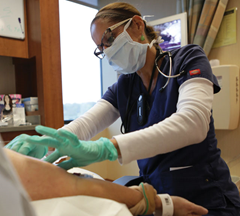Get the Facts In Treating Uterine Cancer

Find Your Perfect Match
Answer a few questions and we'll provide you with a list of primary care providers that best fit your needs.
The good news is that most uterine cancers are treatable. The better news is that you and your doctors have options.
Treatment choices depend on where cancer started in your uterus and if and where it has spread.
Most often, surgery is doctors’ first choice to fight uterine cancer.
Most often, surgery is doctors’ first choice to fight uterine cancer. But radiation therapy, chemotherapy, and hormone therapy are valuable options, especially when cancer has spread beyond the uterus.
“We’re making great progress in treating uterine cancer, both by improving standard treatments and developing new approaches such as targeted therapies,” says gynecologic oncologist Thomas J. Reid, MD. “It’s rewarding to see women, particularly in the earlier stages of cancer, living longer and with a higher quality of life.”
Treatment Options for Uterine Cancer
 Here are the treatments you and your doctor may consider if you have uterine cancer:
Here are the treatments you and your doctor may consider if you have uterine cancer:
- Surgery to remove the uterus. Your doctor will likely remove your uterus and your fallopian tubes, ovaries, and nearby lymph nodes if the tumor is large or the cancer has spread. Because your body will no longer produce female hormones, you may have hot flashes, vaginal dryness, and night sweats. You will stop having menstrual periods and will not be able to get pregnant.
- Radiation therapy. Radiation therapy comes into play several ways in the treatment of uterine cancer. If you can’t have surgery because of your general health, your doctor may recommend radiation therapy instead of surgery to destroy cancer cells in the uterus. Radiation before surgery can help to reduce the size of your tumor. And the combination of radiation and surgery has been used at all stages of uterine cancer. If cancer has spread beyond your uterus, your doctor may also add chemotherapy to the treatment plan.
External radiation treatment involves precisely directing high-energy rays at your pelvis to kill any stray cancer cells not removed during surgery. An internal approach involves placing a narrow cylinder filled with radioactive seeds into your vagina. It remains there for a few minutes.
Radiation treatment may cause dryness, itching, or burning in the vagina. Fatigue, nausea, vomiting, diarrhea, and urinary problems are other possible side effects of external radiation. - Hormone therapy. Some uterine tumors need hormones to grow. If lab tests show that your uterine tumor is one of these, hormone therapy may be an option. You’ll take medicine, usually a pill or shot, to stop the growth and spread of cancer cells by preventing hormones from reaching them. Typically, women who have hormone therapy have advanced uterine cancer. The treatment may be an option for some women with stage I uterine cancer who want to keep their uterus and have children. The most common hormone therapy drug is progesterone tablets. Possible side effects include weight gain, swelling, and breast tenderness.
- Chemotherapy. If you’re having chemotherapy, you’ll generally have drugs injected into a vein to directly kill cancer cells. This treatment often follows surgery to prevent a cancer that has a high rate of returning. It is also helpful if surgery can’t completely remove your uterine cancer. For advanced cancer, your doctor may use chemotherapy alone or with radiation. Chemotherapy kills fast-growing cancer cells, but it can also harm normal cells that divide rapidly, such as blood, hair, and digestive tract cells. This is why many women experience side effects such as fatigue, loss of hair, nausea, diarrhea, or a weakened immune system from low blood counts. Other possible side effects include skin rash, tingling or numbness in your hands and feet, hearing problems, loss of balance, joint pain, or swollen legs and feet. Your care team can help you manage these problems.
Gynecologic oncologist Michael Guy, MD, discusses various treatments for uterine cancer.
Click play to watch the video or read video transcript.
Clinical Trials
Ask your doctor if you qualify for any clinical trials. These studies test new treatments that may be more effective than standard treatment. This is especially important if you have a more advanced stage of cancer with lower survival rates.
“We’re excited about new treatments for uterine cancer. In recent years, researchers have developed targeted therapies called monoclonal antibodies and tyrosine kinase inhibitors that attack specific cancer cells without harming normal cells,” says Dr. Reid.
“With these therapies, there’s great hope of eliminating many of the side effects of cancer treatment.”
Treatment Of Endometrial Cancer By Stage
Cancer stages describe whether the cancer is confined to your uterus or if it has spread to nearby organs or distant sites in the body. Your treatment depends on the stage of your cancer and whether the type of cancer cell is likely to grow slowly or rapidly. These are the most common treatments for endometrial cancer.
Stage I
- Surgery alone
- Surgery with radiation therapy or chemotherapy
- Hormone therapy using an oral progesterone-type drug or an intra-uterine device
Stages II and III
- Surgery with radiation therapy or chemotherapy
Stage IV
- Surgery
- Radiation therapy
- Hormone therapy
- Chemotherapy
Treatment Of Uterine Sarcoma By Stage
These are treatment options for uterine sarcoma. The stages range from I, where the cancer is confined to the uterus, through IV, where the cancer has spread to distant sites in the body.
Stages I and II
- Surgery to remove the uterus, fallopian tubes, ovaries, and lymph nodes
- Surgery followed by radiation therapy to the pelvis
- Surgery followed by chemotherapy
Stage III
- Surgery to remove the uterus, fallopian tubes, ovaries, and lymph nodes
- A clinical trial of surgery followed by radiation therapy to the pelvis
- A clinical trial of surgery followed by chemotherapy
Stage IV
There is no standard treatment for patients with stage IV uterine sarcoma. Ask your doctor about clinical trials using chemotherapy.
Find Your Perfect Match
Answer a few questions and we'll provide you with a list of primary care providers that best fit your needs.
Source: National Cancer Institute; Cancer.Net; American Cancer Society; Centers for Disease Control and Prevention; Thomas J. Reid, MD, Premier Gynecologic Oncology; Michael Guy, MD, Premier Gynecologic Oncology







